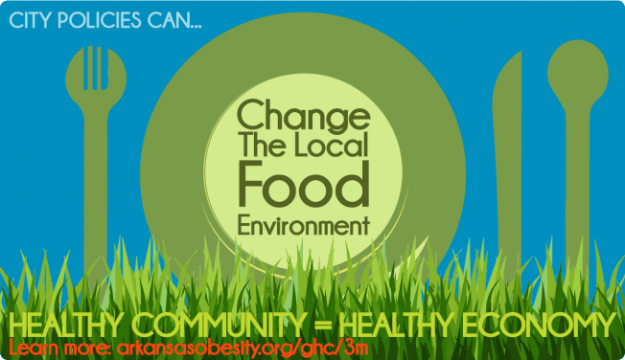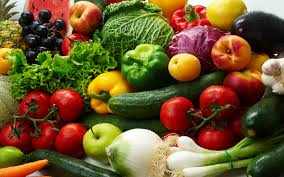
The science is clear: the food environment makes a difference.
People who live in places with many unhealthy food outlets have significantly higher rates of obesity and diabetes than those with more opportunities to buy healthy food, regardless of race or wealth. Making the decision to eat healthier is much easier when nutritious food is available near the places we live, work, learn, play, and pray.
City Policies Can Change the Local Food Environment
It is not surprising that when people live, work, learn, play and pray in places crowded with fast-food and convenience stores, they are at significantly higher risk of developing chronic health conditions. City leadership can improve community health through policies that expand access to healthy food options. Some things you can even do right now:
Assess the Local Food Environment
Some cities have food swamps, areas with many high-calorie, low-nutrition choices, but few options for someone who wants to eat healthy. Others have food mirages, areas where healthy foods are out of reach for local residents due to high cost or lack of transportation. Some cities have both.
- Assess your community – Work with student groups such as the UCA Dietitians Summer Internship or do an assessment yourself by mapping grocery stores, supercenters/club stores, convenience stores, farmers’ markets, co-ops, restaurants (distinguish between fast food, full service, local flavor). If you wanted to go a step further, you could compare the distribution of grocery stores, etc. to population density, age, race, gender, income, education level, language spoken in the home.
Act to Expand Healthy Food Options
Farmers’ Markets can range from an informal coordinated gathering spot to the very significant investment of a customized permanent structure with demonstration kitchen, program space, public announcement system, public restrooms, and more.
State
- Arkansas Farmers’ Market Association – AFMA strives to serve markets throughout the state by providing a forum where market managers can network and receive the latest information, education and research, and by advocating on behalf of Arkansas farmers.
- Arkansas Market Maker – MarketMaker is a national network of states that connect farmers and fishermen with food retailers, grocery stores, processors, caterers, chefs, and consumers. It is an ever-growing partnership of Land Grant Universities, Departments of Agriculture, and food and agricultural organizations investing in a coordinated effort to build a virtual infrastructure that brings healthier, fresher, and more flavorful food to the average consumer.
- Arkansas Farm Service Agency (FSA) – Farm Service Agency is equitably serving all farmers, ranchers, and agricultural partners through the delivery of effective, efficient agricultural programs for all Americans.
- Arkansas Grown – ArkansasGrown.org was developed by the Arkansas Agricultural Department (AAD) to help potential buyers locate Arkansas producers. Any resident of Arkansas who produces an agricultural product in our state may list their marketing information on this site at no charge. AAD may also make this information available for distribution in other formats.
- Farmers’ Market Vendor Guide – Produced by the Arkansas Department of Healthy and Arkansas Agriculture Department, this is a guide for both farmers and the consumer.
- Arkansas The Natural State: Farmers Markets – Make sure to register your farmers’ market with the Arkansas Department of Agriculture so it’s included in this online directory.
National
- CDC Farmers Markets, Community Supported Agriculture, and Local Food Distribution – An informative resource library/white papers.
- USDA: SNAP Benefits at Farmers’ Markets – The number of farmers’ markets licensed to accept SNAP benefits is increasing nationwide. Make sure yours is in that category. They even have a SNAP How-To Handbook jointly produced by the USDA Agricultural Marketing Service and the USDA Food and Nutrition Service Project for Public Spaces, Inc.
- WIC Farmers’ Market Nutrition Program – The WIC Farmers’ Market Nutrition Program (FMNP) is associated with the Special Supplemental Nutrition Program for Women, Infants and Children, popularly known as WIC. The WIC Program provides supplemental foods, health care referrals, and nutrition education at no cost to low-income pregnant, breastfeeding, and non-breastfeeding post-partum women, and to infants and children up to 5 years of age, who are found to be at nutritional risk.
- Senior Farmers’ Market Nutritional Program – The Senior Farmers’ Market Nutrition Program (SFMNP) awards grants to States, U.S. Territories, and federally recognized Indian tribal governments to provide low-income seniors with coupons that can be exchanged for eligible foods (fruits, vegetables, honey, and fresh-cut herbs) at farmers’ markets, roadside stands, and community-supported agriculture programs.
Community & School Gardens give individuals an opportunity to take control of their food security, build community, can provide some physical activity and learning opportunities, and may be a way to turn an ugly or overgrown piece of real estate into something beautiful. Gardens, like farmers’ markets, can span the financial gamut of very low-cost to significant investment.
- American Community Garden Association – The Mission of the American Community Gardening Association is to build community by increasing and enhancing community gardening and greening across the United States and Canada. Check out their 10 Steps to Starting a Community Garden if you’re just getting started.
- Let’s Move: Community Garden Checklist – Before you start a garden of your own, read and download this step-by-step guide, which offers important information about how to safely grow your own fruits and vegetables with others in your community.
- Gardening Matters: How to Start a Community Garden – Complete with a step-by-step community garden start-up guide to help get the garden started on a solid foundation.
- North Little Rock Fit 2 Live Community Gardens – Community gardens are any piece of land gardened by a group of people. They can be located at a school, church, or residential area. They can grow any combination of vegetables, herbs, and flowers. They can consist of one community plot or many individual plots. NLR’s Fit 2 Live Community Garden program includes a funding proposal form, budget report form, and progress report form.
- Let’s Move: School Garden Checklist – Whether you’re looking for a new way to capture your students’ interest as the weather breaks or you simply need to add some life to your classroom or school, planting a school garden will do the trick.
- Edible School Yard Project – The mission of the Edible Schoolyard Project is to build and share a national edible education curriculum for pre-kindergarten through high school. They envision gardens and kitchens as interactive classrooms for all academic subjects, and a free, nutritious, organic lunch for every student. Integrating this curriculum into schools can transform the health and values of every child in America.
- Arkansas GardenCorp – The mission of Arkansas GardenCorps is to promote the use of school and community gardens to provide nutrition education with the purpose of reducing childhood obesity and to increase environmental awareness and sustainable agriculture practices in Arkansas communities. Arkansas GardenCorps offers school and community gardens a full-time 1700-hour and/or a part-time 900-hour AmeriCorps Service Member for one year
- FoodCorps – FoodCorps is a nationwide team of AmeriCorps leaders who connect kids to real food and help them grow up healthy.
Arkansas Local Food Network – The Arkansas Local Food Network seeks to connect farms to tables, growers to customers, and people to their communities.
ChangeLab Solutions Food Retail – There are many ways to increase access to healthy foods in a community. Developing new grocery stores and cooperatives, creating farmers’ markets, and improving the quality of foods sold at convenience stores are all ways to increase a community’s access to healthy foods. ChangeLab Solutions provides publications related to increasing access to healthy food retail.
Cooking Matters – Share Our Strength’s Cooking Matters and Shopping Matters programs teaches families at risk of hunger how to get more from their food resources and cook healthy meals through cooking, shopping, and nutrition education.
The Food Trust – The Food Trust is a nationally recognized non-profit dedicated to ensuring that everyone has access to affordable, nutritious food and information to make healthy decisions. Headquartered in Philadelphia, The Food Trust works with neighborhoods, schools, grocers, farmers, and policymakers in the city and across the country to develop a comprehensive approach to improved food access that combines nutrition education and greater availability of affordable, healthy food.
The Corner Store Initiative – In 2004, The Food Trust piloted the Healthy Corner Store Initiative to motivate youth and adults to purchase healthier items through classroom education and direct marketing in the corner stores.
Community Commons: Giving Business the Incentive to Promote Healthy Lifestyles – Business owners regularly make decisions that can have tremendous impacts on community health – decisions about where homes are built, where businesses are located, and what kinds of products and services are available. Businesses can be powerful allies when it comes to improving public health. With the right incentives from local governments, business owners can be encouraged to invest not only in their own growth but also in new opportunities for physical activity and access to healthy, affordable food.
Make the Link between Hunger & Obesity
Arkansas Hunger Relief Alliance – At 19.7 percent, Arkansas ranks among the highest in the nation in household food insecurity. The Arkansas Hunger Relief Alliance, through our member food banks, relief agencies, volunteers and corporate partners, is committed to providing programs, food resources, education, and advocacy to feed Arkansas’s hungry.
Drexel University Center for Hunger-Free Communities – A research, service and policy/advocacy center of Drexel University School of Public Health in Philadelphia, PA. The Center for Hunger-Free Communities offers the same multi-faceted research and action that has characterized the work on hunger and poverty at Drexel with the goal of developing innovative, empirically-tested solutions to the challenges of hunger and economic insecurity.
- Witnesses to Hunger Toolkit – The Witnesses to Hunger Toolkit is a positive partnership: advice from witnesses to hunger on engaging your community in advocacy.
- Use Your Power Guide – The Use Your Power Guide was an idea hatched by Witnesses to Hunger when the witnesses first began meeting as a group. They envisioned a guide, written woman-to-woman, with advice for people going through similar struggles.



